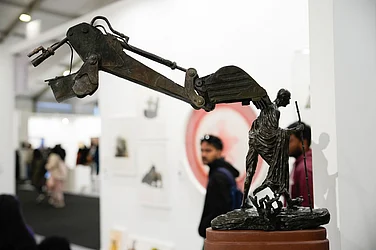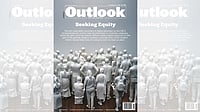A party office discarded for years by its leader suddenly burst into life. As Congress workers got a whiff of change, they trooped to the party headquarters on 24 Akbar Road to find out who would succeed P.V. Narasimha Rao. Even the chanters, contracted by party General Secretary R.K. Dhawan and Youth Congress President M.S. Bitta to spout pro-Rao slogans, felt it was time for them to exit. They knew their shout was futile—especially after Special Judge Ajit Bharihoke had summoned Rao in the Lakhubhai Pathak cheating case.
At his 9 Motilal Nehru Marg residence, about 150 yards from the party office, Rao chaired his farewell meeting of the Congress Working Committee (CWC) on September 23. After he sought the opinion of CWC members and some special invitees, Rao declared Sitaram Kesri, the 78-year-old freedom fighter from Bihar, as the 62nd president of the 111-year-old party. Rajesh Pilot’s lone voice of dissent—he wanted the election of the regular president deferred till the All India Congress Committee (AICC) session—didn’t tilt the balance. And there was no opposition from A.K. Antony—Kerala’s Mr Clean refused to even press for his candidature.
For Rao, who, at a Youth Congress rally at the Red Fort three years ago, screamed that there should be a national debate on who should succeed him, the change was without resistance and smooth. The day after, September 24, Rao’s nameplate was taken off and the new incumbent moved into the office adjoining the one he occupied for years as party treasurer.
Rao had earned the sobriquet of an absentee leader both in the party and in Parliament, and not many tears were shed on his exit, especially after the Pathak case. His resignation paved the way for a new man at the helm, but his tenure had caused irreparable damage to the party.
"It is an honour for an ordinary party worker," Kesri said after he was elected party chief. The moot point is how well he will adapt to his new high-pressure job, whether at this stage of his political career he can muster up the leadership qualities the party workers will be looking forward to. They are currently a demoralised lot, thanks to a series of electoral debacles and the unprecedentedly corrupt image that the Congress has built up over a period of time, specially during the past five years under Rao.
Kesri has quite a task at hand. His performance will be gauged by how well the masses receive him. This, in turn, hinges on his ability to execute damage-control measures and rebuild the party on a sustainable platform. The first goal will be to rescue the party’s sagging image. This depends on what stand Kesri and the party adopts on corruption. To project a cleaner image, they have to ensure that Rao resigns as Congress Parliamentary Party leader. "Rao’s chargesheet in the St Kitts forgery case has damaged the party," Kesri admitted, though he chose to stay mum on the question of the CPP post. On September 27, he called on Rao and apparently sent clear hints—that, as a senior leader, he was aware what steps would be in the interest of the party. But such subtlety might not work. And after Rao assiduously backed him for the top post, Kesri will find it difficult to publicly demand his resignation.
A senior AICC functionary was, however, in no mood to be appeased on this score: "If Sitaram Kesri publicly favours Sukh Ram’s expulsion from the party on corruption charges, and if half-a-dozen former ministers, including Madhavrao Scindia, were denied Congress tickets after the hawala scam, how can this man continue as CPP leader? Kesri should either revoke Sukh Ram’s suspension or treat Rao at par".
But till Kesri consolidates his position, first by securing the resignation of all AICC office-bearers, he has to put up with Rao. Rao, given his record, will be in no hurry to quit as CPP chief, but the pressure is building up on him.
"There can’ be two yardsticks for Rao—if he has quit as party chief, he must give up the CPP post too," says Bhupinder Singh Huda, MP from Haryana. Like Huda, about a dozen MPs favour a CPP meet to discuss the issue. They are also agitated that the CWC heaped eulogies on Rao, lauding him for his successful stint as party leader and prime minister. "Worse, it passed a resolution reiterating its faith in Rao’s leadership in the party’s struggle for the realisation of goals set before it by the Indian National Congress," a senior MP said in disgust, cynically wondering how corruption was construed as one of the INC’s goals.
The resolution might have been a routine affair. But it has created an impression that Kesri will be a mere puppet in Rao’s hand. And that the CWC, packed with Rao loyalists, would make that impression almost indelible. "There is no need for Rao to resign as CPP leader. After all, the Congress is the umbrella organisation and he has resigned as president," says Devendra Dwivedi, AICC general secretary.
Kesri certainly sees through the game and is trying to look beyond Rao. During the AICC office-bearers’ meeting on September 27, General Secretary Ahmed Patel suggested that the entire lot should resign to enable the party president to choose his own team. Madhavsinh Solanki was the first to resign; the rest are likely to follow in his footsteps. The idea is that if Kesri appoints new general secretaries and a treasurer, they will be ex-officio members of the CWC and since most of the elected members are already anti-Rao, Kesri will get their support besides that of his nominees.
But for the Congress, what is more relevant is getting back mass support instead of concentrating on the 21-member CWC. Some of the state units, which fared badly in the recent elections, will be in for an overhaul. Kesri has also pleaded for a moratorium on factional feuds in the party. There is a caste angle too. There is a lurking fear among upper-caste party leaders that, "given his bias against" them, Kesri’s stint might see their gradual elimination. The new boss has been at pains to show that he makes a fine distinction: that pro-social justice doesn’t necessarily mean anti-upper caste. His agenda is for a "social transformation" catalysed by the Congress. And he stresses on unity and reconciliation, almost to a fault.
The strategy here is two-fold: to win back the old constituency—scheduled castes, scheduled tribes, minorities, OBCs—and to get back into the party fold some influential former Congress leaders. For this, he has to display a willingness to accommodate all viewpoints without appearing to have lost control. And unless Kesri has his own working committee and his men in the state units to make this possible, things will remain the same.
Kesri has already taken certain initiatives. Karnataka Congress Party leader S. Bangarappa met him recently and offered to rejoin the party if "the KCP is treated honourably". Bangarappa’s party got seven per cent votes and 10 seats in the state assembly elections in November 1994, relegating the Congress to third place. The fact that Bangarappa was expelled by Rao in 1993 has not deterred Kesri from making such overtures. This suggests an independent mind rather than a puppet on strings. His frequent calls to Sonia Gandhi is another thing Rao may not be happy about.
"Kesri’s election is a positive move", says Congress (T) leader Arjun Singh. To be sure, this reaction is influenced more by his hostility towards Rao than by any liking for Kesri. After all, it was Kesri who had taken the lead to scuttle Singh and his group’s one-man-one-post demand during the Surajkund session in March 1993.
Unlike Rao, Kesri is not an absentee leader. As a treasurer, he used to visit the party office thrice daily whenever in town. He interacts personally with party workers, a fact that promises to make the party’s Akbar Road headquarters a pilgrimage once again. Sources say that in the past five years Rao visited this office only to chair some condolence meetings and about three or four CWC meetings. Most CWC and election meetings were held at his residence. The high security Prime Minister’s residence made him inaccessible to the ordinary workers as well as senior party leaders.
For Rao, a political revival looks a trifle too remote. The CWC, in its future makeup, may not bother about the niceties the eulogis ing September 23 resolution was filled with. Kesri, on his part, will have his hands full. "He needs some time to decide on organisational matters. The AICC could be postponed for that," suggests Tariq Anwar, the party’s minority cell chief. The idea is to consol idate support in the AICC before it meets. His confirmation there will be read as a pro-backward gesture. But cosmetic exercises alone won’t convince the alienated masses. Unless backed by an effective machinery that can translate slogans into action.


























